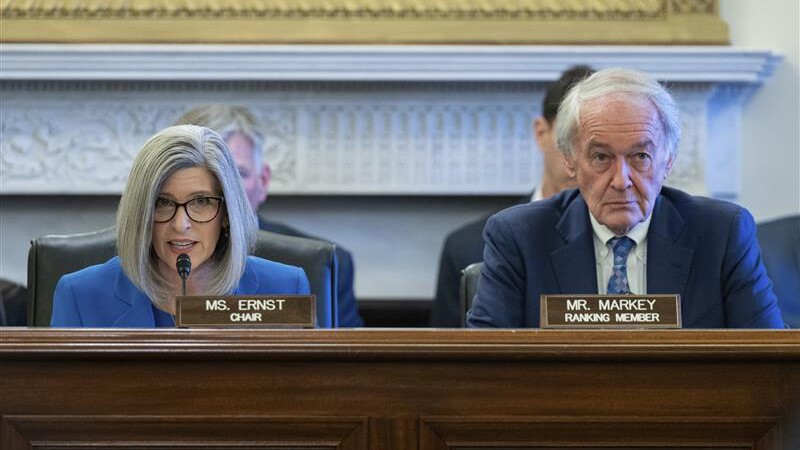Small Business R&D Programs Lapse

Sens. Joni Ernst (R-IA, left) and Ed Markey (D-MA), chair and ranking member of the Senate Small Business Committee, at a committee hearing.
Annabelle Gordon/Sipa USA
Authorization of two technology maturation programs for small businesses lapsed last week, requiring agencies to pause new awards and solicitations until Congress passes a reauthorization bill. The House passed a short-term reauthorization bill
Agencies with large extramural research budgets — such as the Department of Defense, Department of Energy, and the National Science Foundation — set aside a portion of those funds for small business R&D through the Small Business Innovation Research (SBIR) and Small Business Technology Transfer (STTR) programs, which currently allocate around $4 billion to $6 billion annually. The programs have received bipartisan support in Congress but have only been renewed for a few years at a time.
Agencies can continue to fund current awards during the lapse in authorization. They cannot issue new SBIR or STTR solicitations or make new awards under existing solicitations, though they can still choose to issue solicitations for small businesses to perform research, congressional staff said.
The government shutdown has likely further complicated agencies’ ability to maintain the program, since many government workers are furloughed and cannot issue additional solicitations or funds. That said, SBIR awardees can continue their work if they have cash on hand. Alec Orban at the Small Business Technology Council said he has not yet heard of any members of the organization receiving stop-work orders on their current projects.
For now, DOD has given guidance to companies stating that while current contracts “remain valid unless otherwise directed,” new solicitations are paused and pending awards will only proceed if funding from fiscal year 2025 is still available, Breaking Defense reported.
According to a primer
Clean bill versus new rules
Ernst objected to Markey’s “clean” reauthorization, offering an alternative plan that would extend the reauthorization for one month and add several changes to eliminate “small business welfare,” attract new entrants, and strengthen research security provisions.
Ernst’s bill introduces a $75 million lifetime cap on SBIR awards for any one company. The provision is intended to eliminate “SBIR mills,” which “collect an outsized portion of the funding, with fewer results to show for it,” she said. A Defense Innovation Board report
The bill would also restrict the number of award proposals that a single company can offer annually, the number of proposals a company can submit for each solicitation, and the number of proposals on which an individual may concurrently serve as the primary investigator for.
To bring in new awardees, the bill would reserve some funding to make smaller, one-time awards to companies without prior awards, which Ernst states would allow agencies to fund about 2,700 new companies annually.
Regarding research security, the bill would establish a definition of “foreign risk” across all participating agencies and allow agencies to take back funding if a business provides intellectual property to a foreign country.
Markey argued the bill would prevent small businesses from pursuing riskier innovation. He also called the foreign due diligence requirements “wide-sweeping,” saying they allow agencies to deny applications “on whatever grounds they see fit.”
Ernst called her proposals “basic safeguards” and said, if lawmakers cannot agree to them, “this SBIR set-aside charade should end.” The research dollars should instead return to the agencies’ R&D budgets, which would still allow small businesses to compete for research awards, she added.
Republican and Democratic leaders of the House Science and Small Business committees issued a joint statement


